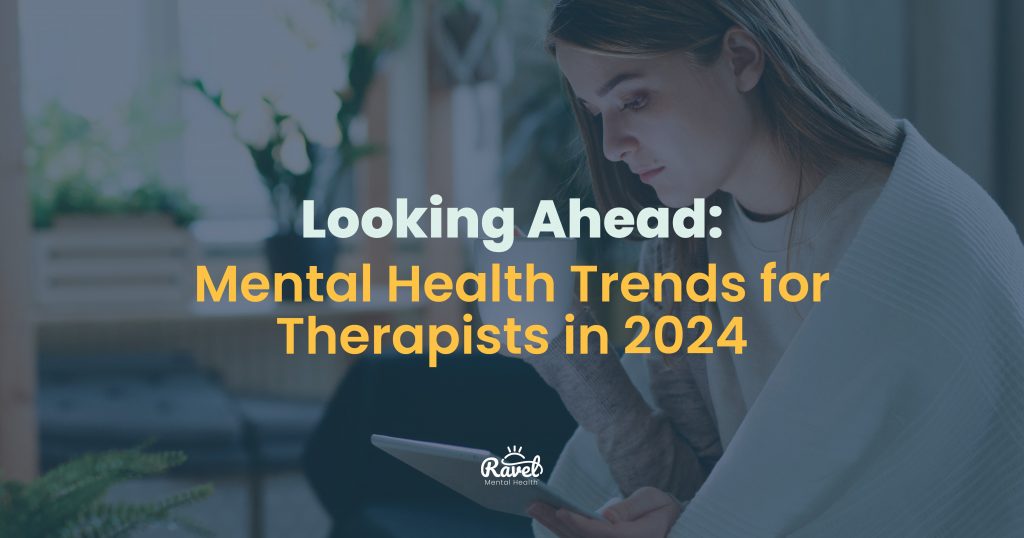As we enter 2024, the mental health care landscape is poised for transformative shifts, and therapists and mental health providers should prepare to meet the evolving needs of clients through innovative approaches and enhanced skill sets.
Let’s explore the trends that may shape the mental health arena in the coming year and beyond.
Nurturing Safety, Empowerment, and Respect
Trauma-informed care is becoming more and more widely recognized, reflecting a paradigm shift in mental health practices. Therapists are embracing approaches that prioritize safety, empowerment, and respect, fostering an environment conducive to healing.
Clients can truly benefit from an enhanced sense of safety in therapy sessions, empowerment in addressing personal trauma, and a deepened understanding of their unique experiences.
Bridging the Gap between Mind and Body: Integrated and Holistic Care
Recognizing the intricate link between mental and physical well-being, therapists are venturing into integrated care. Collaborations with medical professionals are on the rise, exemplified by the emergence of somatic therapy. This holistic approach addresses mental, emotional, and physical wellness, offering clients a profound healing experience.
A Call for Inclusive Care: Competence, Diversity, and Privilege in Culture
In 2024, cultural competence will be a core focus, ensuring therapy is inclusive and respectful of diverse backgrounds. This emphasis is particularly critical in couples therapy, where partners from varied cultural contexts navigate the impact of social injustice and bias.
Therapists are adapting to provide sensitive and tailored approaches that acknowledge the unique challenges clients face.
Mindfulness Going Mainstream in Psychotherapy
Mindfulness and meditation are transcending therapeutic trends, becoming integral to psychotherapy practices. Widely acknowledged for stress reduction and emotional well-being enhancement, mindfulness practices are gaining momentum.
The Internal Family Systems (IFS) model, incorporating mindfulness techniques, emphasizes connecting with “self-energy” for profound healing and could be implemented more and more in the coming year.
Unraveling the Brain’s Complexities: Neuroscience, Neurobiology, and Psychology
Moving beyond traditional symptom-focused approaches, therapists are delving into neuroscience to understand how the brain forms patterns, especially in response to trauma.
Concepts like repatterning and memory reconsolidation are gaining traction, offering more effective strategies for managing anxiety and trauma.
Focused Care for LGBTQA+ Clients: Gender and Sexual Identity Trends
A growing focus in 2024 is providing affirming care for LGBTQA+ clients. Therapists are prioritizing training in nonbinary gender therapy and supporting individuals in gender transitions, ensuring safe and inclusive environments. This trend addresses the unique challenges faced by clients in their gender and sexual identity journeys.
Therapist Self-Care and Wellbeing
Acknowledging the importance of therapist well-being, 2024 sees a surge in self-care practices. Therapists are prioritizing their mental health through supervision, self-reflection, and activities like therapeutic yoga.
The result? Improved quality of care, more empathetic therapy sessions, and fulfilled psychotherapists.
2024 and Beyond: Innovations in Therapy
The future of mental health care also holds the possibility of many exciting innovations.
Virtual Reality Therapy: Expected to grow, VR therapy creates immersive environments for exposure therapy and mindfulness exercises.
AI-Powered Therapy: AI tools like chatbots offer personalized support and guidance, based on individual needs.
Teletherapy: Online therapy is becoming widely accepted, providing convenient access to mental health services.
Digital Therapeutics: Software-based interventions designed to treat specific mental health conditions are on the rise.
Wearable Devices: Smartwatches and fitness trackers are evolving to monitor mental health indicators, offering valuable data for management.
Gamified Therapy: Gamification makes mental health care interactive and engaging, motivating individuals to participate in therapeutic activities.
As we stand on the cusp of 2024, we’re not just witnessing the future; we are actively shaping it in the mental health community. Embracing these trends, mental health providers are poised to offer even more effective and personalized care to their clients, ushering in a new era of mental well-being.
The journey ahead promises innovation, growth, and a deeper understanding of the intricate connections between mind, body, and spirit.
